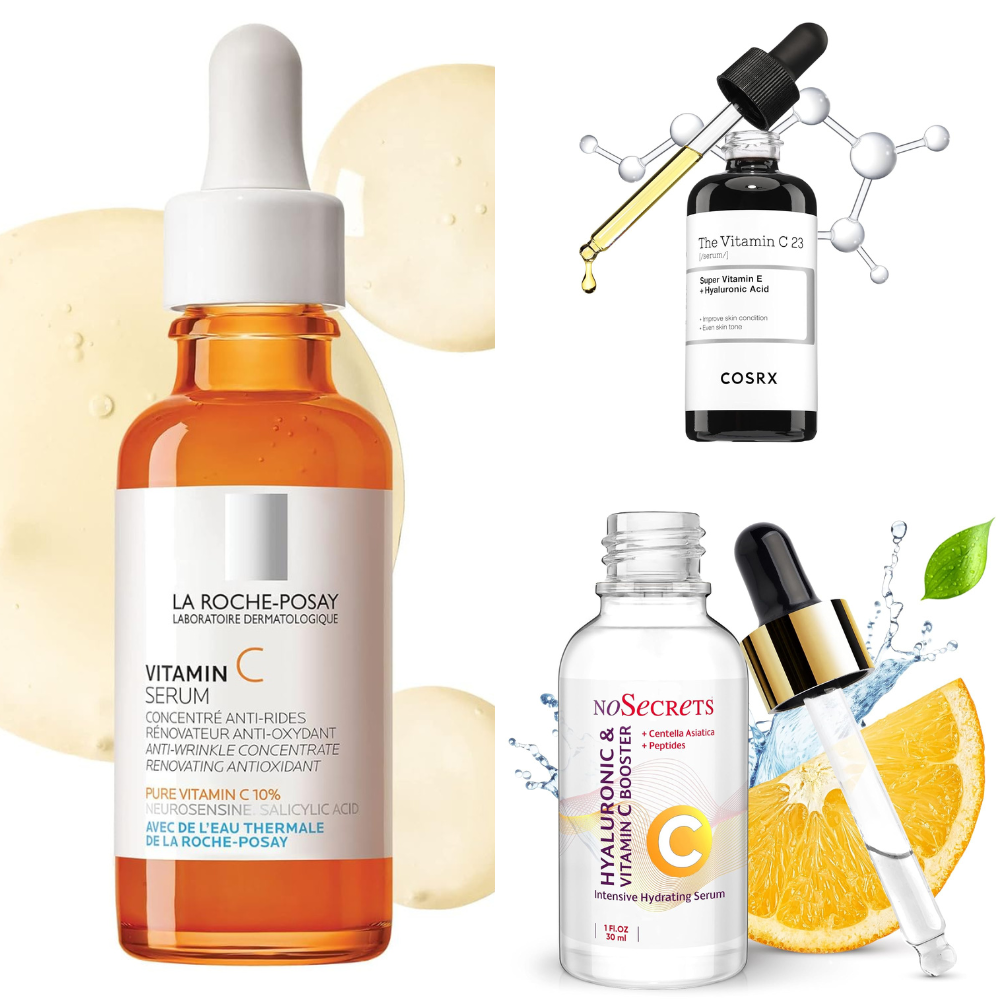Key Takeaways:
- Vitamin C serum is a potent antioxidant that can neutralize free radicals and aid in your skin's natural regeneration process.
- Regular use of vitamin C serum can help reduce the appearance of fine lines, wrinkles, and dark spots, promoting a more even skin tone.
- Incorporating vitamin C serum into your daily skin care routine can enhance protection against sun exposure and environmental stressors.
Vitamin C serum has become a staple in the realm of skin care, lauded for its myriad of benefits that cater to a wide array of skin concerns. From brightening effects to its role in collagen synthesis, the topical application of this potent antioxidant is a game-changer for anyone seeking a healthier, more youthful complexion. In this comprehensive guide, we'll delve into the numerous vitamin C serum benefits, providing you with all the information you need to make this skin care superhero a part of your daily regimen.
The Antioxidant Powerhouse: Neutralizing Free Radicals
Vitamin C, or ascorbic acid, is naturally present in the skin, where it serves as a key antioxidant. When applied in serum form, it penetrates the skin cells and works to neutralize free radicals—unstable molecules that can cause oxidative stress and damage to the skin. This damage is a contributing factor to aging and can exacerbate the appearance of fine lines and wrinkles. By using vitamin C serums, you're directly supplying your skin with a concentrated dose of antioxidant protection, which can help maintain a youthful glow and a healthy skin barrier.
Boosting Collagen: The Secret to Firm, Plump Skin
Collagen synthesis is crucial for maintaining skin elasticity and firmness. As we age, our natural collagen production decreases, leading to the development of fine lines and wrinkles. Vitamin C is a key component in the process of collagen production. Research suggests that the topical application of vitamin C serums can stimulate the skin to ramp up its collagen production, resulting in firmer, more plump skin over time. This increased collagen production can also aid in wound healing and the reduction of scar appearance.
A Brighter Complexion: Reducing Dark Spots and Hyperpigmentation
One of the most celebrated vitamin C serum benefits is its ability to reduce hyperpigmentation and dark spots. This is achieved through the inhibition of melanin production, which can lead to a more even skin color and a reduction in the visibility of dark circles under the eyes. Regular application of a vitamin C serum can lead to a brighter, more radiant complexion, as it works to fade these areas of discoloration.
Sun Damage Defense: Strengthening Skin's Resilience
While vitamin C serums are not a substitute for sunscreen, they can provide an additional layer of protection against UV light. The antioxidant properties of vitamin C can help mitigate the harmful effects of sun exposure, which is a leading cause of premature skin aging. By combining vitamin C with your daily SPF, you're enhancing your skin's defense against environmental stressors that can lead to sun damage and the breakdown of collagen.
Hydration and Moisture Retention: The Hyaluronic Acid Synergy
Many vitamin C serums also contain hyaluronic acid, a powerful hydrating agent that can hold up to 1000 times its weight in water. This combination ensures not only the brightening and protective effects of vitamin C but also a hydrating effect that can decrease transepidermal water loss. The result is skin that feels more supple and appears more dewy, as the serum helps to lock in moisture for long-lasting hydration.
Anti-Inflammatory Action: Calming Sensitive Skin
Sensitive skin can greatly benefit from the anti-inflammatory properties of vitamin C. It can help reduce redness and inflammation, making it an excellent choice for those with conditions like acne vulgaris or rosacea. By incorporating a vitamin C serum into your skin care routine, you can help soothe irritated skin and promote a more balanced complexion.
Combating Acne: A Dual Approach
Vitamin C's anti-inflammatory action is complemented by its ability to improve cell turnover. This means that it can help speed up the healing process of acne lesions while also preventing new breakouts. The serum's antibacterial properties can also help keep the skin clean and reduce the likelihood of acne flare-ups.
Enhancing Skin Texture: Topical Vitamin C's Role in Smoothing and Refining
Topical vitamin C, or topical ascorbic acid, is not just a fleeting trend in the realm of skincare products; it's a scientifically-backed ingredient that can significantly enhance skin texture. By promoting collagen synthesis, it helps to smooth out fine lines and refine the skin's surface, giving you that coveted youthful glow. Studies have shown that consistent use of vitamin C serums can lead to a visibly more supple and less textured complexion over time, which is why it's often hailed as a staple in anti-aging regimens.
Moreover, the health benefits of vitamin C extend beyond its anti-aging prowess. Its anti-inflammatory properties make it a gentle yet effective component for those with skin prone to redness and irritation. By incorporating topical vitamin C into your skin care routine, you're not only working towards a smoother appearance but also calming your skin. This dual action is particularly beneficial for individuals with conditions like rosacea, where the skin's texture and inflammation go hand in hand.
The Science of Hydration: Decreasing Transepidermal Water Loss
Keeping your skin hydrated is a cornerstone of any effective skincare regimen. One of the lesser-known benefits of Vitamin C serum is its ability to decrease transepidermal water loss (TEWL). This refers to the moisture that your skin naturally loses to the environment, which can lead to dryness and dehydration. By bolstering the skin's barrier function, Vitamin C serums can help lock in moisture, ensuring your skin stays hydrated and plump throughout the day.
In a randomized controlled trial, the gold standard of clinical research, participants who used topical Vitamin C experienced significant improvements in skin hydration. This is partly due to Vitamin C's ability to enhance the production of barrier lipids, which are essential for retaining moisture. So, not only does Vitamin C brighten and protect, but it also plays a crucial role in keeping your skin's thirst quenched. Remember, hydrated skin is happy skin, and a good Vitamin C serum can be your best ally in achieving that dewy, moisturized look.
Scientific Backing: The Evidence Behind Vitamin C's Skin Benefits
The action and clinical applications of vitamin C in skincare have been the subject of numerous studies, including randomized controlled trials, which are the gold standard in clinical research. These studies have consistently demonstrated that topical ascorbic acid can improve antioxidant levels in the human skin, protecting it against environmental stressors that contribute to premature aging. For instance, a full-face iontophoresis mask infused with vitamin C has been shown to deliver antioxidants deep into the skin, enhancing its protective barrier.
Furthermore, the long-term treatment benefits of vitamin C serums are not just anecdotal; they are well-documented in scientific literature. Regular application of vitamin C has been found to decrease transepidermal water loss, helping the skin retain moisture and maintain its elasticity. This is particularly important for those looking to combat the signs of aging, as hydrated skin is less likely to show wrinkles and fine lines. By choosing the right vitamin C products, you're investing in a scientifically supported method to keep your skin healthy and resilient.
The Versatility for All Skin Types
One of the great things about vitamin C serums is their suitability for a variety of skin types. Whether you have oily, dry, or combination skin, there's a formulation out there for you. For those with oily skin, serums with a water base can provide the benefits of vitamin C without adding excess oil. Dry skin types may benefit from serums that include moisturizing ingredients like vitamin E or ferulic acid. And for those with combination skin, a balanced serum can help address multiple concerns at once.
Choosing the Right Formulation: L-Ascorbic Acid vs. Derivatives
When selecting a vitamin C serum, it's important to consider the form of vitamin C used in the product. L-ascorbic acid is the most biologically active form of vitamin C and is known for its potent skin benefits. However, it can be unstable and irritating to some skin types. Derivatives like magnesium ascorbyl phosphate and ascorbyl palmitate are more stable and gentle, making them a good choice for sensitive skin.
Maximizing Efficacy: How to Apply Vitamin C Serum
For optimal results, apply vitamin C serum to clean, dry skin. A few drops are usually sufficient to cover the full face. It's best to use the serum in the morning, as its antioxidant properties can help protect the skin throughout the day. After applying the serum, wait a few minutes for it to absorb before continuing with your skincare routine.
Pairing with Other Antioxidants: The Role of Vitamin E and Ferulic Acid
Combining vitamin C with other antioxidants like vitamin E and ferulic acid can enhance its stability and efficacy. Vitamin E is an antioxidant that complements vitamin C by helping to repair damaged cells and restore moisture. Ferulic acid increases the serum's ability to neutralize free radicals and can also stabilize vitamin C, ensuring that you get the most out of your serum.
Long-Term Treatment: Patience and Consistency
The benefits of vitamin C serum are not instantaneous; it takes time and consistent use to see significant changes in skin health. With regular application, many users report noticeable improvements in skin texture, tone, and overall appearance within several weeks to months. It's important to be patient and maintain a consistent skincare routine to achieve the best results.
Safety First: Conducting a Patch Test
Before adding a new skincare product to your routine, it is vital to conduct a patch test to avoid any potential allergic reactions. Apply a small amount of the serum to an inconspicuous area of your skin and wait for 24 hours to observe any adverse effects. If you encounter irritation or an allergic response, discontinue use immediately.
The Role of Vitamin C in Cosmetic Dermatology
The use of vitamin C in cosmetic dermatology is well-documented in the Indian Dermatology Online Journal and other reputable sources. Topical formulations of vitamin C have been shown to have a range of skin benefits, from anti-aging to photoprotection. Its role in cosmetic dermatology continues to expand as more research highlights its efficacy and versatility.


Can vitamin C serum be used on all skin types?
Yes, vitamin C serum can be used on all skin types. However, it's important to choose the right formulation for your specific skin concerns and to conduct a patch test before regular use, especially if you have sensitive skin.
How often should I apply vitamin C serum?
Vitamin C serum is typically applied once a day, preferably in the morning to take advantage of its protective properties against environmental stressors.
Can vitamin C serum replace my sunscreen?
No, vitamin C serum should not replace sunscreen. While it provides additional protection against sun damage, it does not offer the same level of UV protection as a dedicated sunscreen. It's best to use both products as part of your daily skincare routine.

Vitamin C serum is a powerful addition to any skincare routine, offering a multitude of benefits for skin health. Its antioxidant properties help neutralize free radicals, while its role in collagen synthesis can reduce the appearance of fine lines and wrinkles. Vitamin C also helps to brighten the complexion, reduce hyperpigmentation, and protect against sun damage. When combined with other antioxidants like vitamin E and ferulic acid, its efficacy is enhanced. To reap the full benefits, it's important to choose the right formulation, apply it correctly, and use it consistently over time. Always remember to conduct a patch test before using a new serum to ensure it's suitable for your skin.













